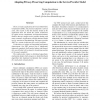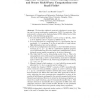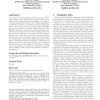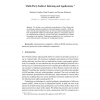CCS
2008
ACM
14 years 5 months ago
2008
ACM
We present FairplayMP (for "Fairplay Multi-Party"), a system for secure multi-party computation. Secure computation is one of the great achievements of modern cryptograp...
CSE
2009
IEEE
14 years 6 months ago
2009
IEEE
There are many applications for Secure Multi-Party Computation (SMC), but practical adoption is still an issue. One reason is that the business model of the application does not m...
CRYPTO
2006
Springer
14 years 6 months ago
2006
Springer
Abstract. We introduce algebraic geometric techniques in secret sharing and in secure multi-party computation (MPC) in particular. The main result is a linear secret sharing scheme...
WPES
2003
ACM
14 years 8 months ago
2003
ACM
Secure Multi-Party Computation enables parties with private data to collaboratively compute a global function of their private data, without revealing that data. The increase in s...
WISEC
2010
ACM
14 years 8 months ago
2010
ACM
Currently, companies are about to optimize their internal processes by monitoring items they handle with Radio Frequency Identification (RFID). However, there is a risk that sens...
WPES
2004
ACM
14 years 8 months ago
2004
ACM
The number of location-aware mobile devices has been rising for several years. As this trend continues, these devices may be able to use their location information to provide inte...
ASIACRYPT
2005
Springer
14 years 8 months ago
2005
Springer
Abstract. We consider scenarios in which two parties, each in possession of a graph, wish to compute some algorithm on their joint graph in a privacy-preserving manner, that is, wi...
ICDM
2006
IEEE
14 years 9 months ago
2006
IEEE
The secure multi-party computation (SMC) model provides means for balancing the use and confidentiality of distributed data. This is especially important in the field of privacy...
ASIACRYPT
2007
Springer
14 years 9 months ago
2007
Springer
Abstract. We develop a new multi-party generalization of Naor-Nissim indirect indexing, making it possible for many participants to simulate a RAM machine with only poly-logarithmi...
IEEEARES
2007
IEEE
14 years 9 months ago
2007
IEEE
In [7] we have proposed a model for the robust and private evaluation of a function within a group of cooperating mobile agents, called an agent Alliance. The model has been given...




